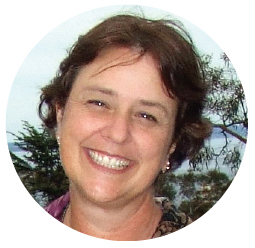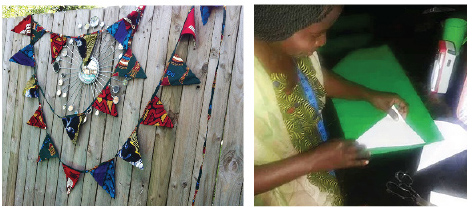December, 2018
by Penny Vos, CPS Partnership Community
 Penny Vos, in Cooma, regional New South Wales, Australia, is the Vice President of the international partnership organization Solidareca Bonvolo. Her initiative Mama Wimbi supports women artisans, students, and their communities in the Democratic Republic of the Congo. She visited Goma, DRC this year with her daughter: ?We visited every home and every school associated with our Solidareca Bonvolo work in Goma, and we opened the school library that I built in honor of my parents.?
Penny Vos, in Cooma, regional New South Wales, Australia, is the Vice President of the international partnership organization Solidareca Bonvolo. Her initiative Mama Wimbi supports women artisans, students, and their communities in the Democratic Republic of the Congo. She visited Goma, DRC this year with her daughter: ?We visited every home and every school associated with our Solidareca Bonvolo work in Goma, and we opened the school library that I built in honor of my parents.?
Constructive Change in the Congo
?Mama? honors the role of the mothers who are making waves of community change for their children?s education. ?Wimbi???is Swahili for ?Wave? because a celebration in France or Australia employs mothers in the Congo, who pay the teachers and buy fabric from local stallholders, who feed their families, and send them to school?..so that a widening ripple of well-being spreads.
The Democratic Republic of the Congo should be among the richest countries in the world. It has gold, diamonds, gas, and coltan: an essential ingredient of mobile phones, which comes from the Congo in quantities only matched by the rest of the world put together. It has more forest than anywhere but Brazil, good volcanic soil, abundant fresh water, spectacular scenery and tourist-enticing wildlife.?
Sadly for the people, their government does not choose to use this wealth for their benefit. The country is one of few in the world which do not even provide free and compulsory education at primary level. There are government schools which seem to offer it, but the reduction in the teachers? wages from US $300 to US $50 per month means that schools must charge the students fees in order to support the teachers to even the meanest standard.
Democracy seems to offer a way out of this misery but the government continues to defer the elections, which should legally have been held two years ago, citing ?civil unrest? (which it is widely suspected of cultivating).
Paying $34-$280 for a year of primary schooling should not be impossible, except for the fact that there is no social security and lack of government spending results in drastic unemployment levels. The majority of the population survives by begging from relatives, in a chain leading back eventually to someone with a job. For most, after renting a shack without power or water, and buying food (rice is a treat, but manioc leaves and foufou do sustain life, in a bitter and gluey way) and (usually second-hand) clothes, there is nothing left to pay for education.
Disadvantage is compounded by the fact that the law, and all official business, is conducted in French which is only learnt in school. Many parents have had patchy education because of war and/or poverty and cannot teach their children French, so exclusion is perpetuated.
In Goma, this depressing politico-economic backdrop contrasts with the natural beauty of the seemingly endless and spotless Lake Kivu, the majestic Nyragonga Volcano, home of the laid-back and??long-haired Mountain gorillas, and the hopeful solidarity of the people.
Goma and the Rwandan city of Gisenyi run into each other across their national borders. The effect of different political priorities can be clearly seen by comparing the lake foreshore on each side of the border. In Congo, the mansions of the wealthy line the lake, leaving narrow gaps for the poor to draw water or to wash themselves and their possessions. In Rwanda, there is a park with grass, trees and garden beds, for recreation. People wash things at home with piped water.
A grass-roots organization called Solidareca Bonvolo was born in Goma in 2004 when a customs officer and his friends decided to band together to help orphans from the First and Second Congolese Civil wars, and the Rwandan genocide of 1994. The same founders also established the Esperanto club of Goma (Solidareca Bonvolo means ?Solidarity Goodwill ? in the Esperanto language).
Support from members of the international Esperanto-speaking community enabled the education of dozens of orphans and poor children for a couple of decades but it was clear that charity alone was neither sufficient nor secure. Something needed to be done to address the chronic unemployment of at least some of the people.
The main resourceable production skill in Goma is sewing, but it is rarely profitable there because the rich prefer to shop internationally, whilst the poor have almost nothing to spend. Consequently, Solidareca Bonvolo teamed up with Rotary International to create the project ?Mama Wimbi?, marketing a product outside of Goma where there are middle-class people willing and able to buy affordable delights.

Mama Wimbi uses brightly coloured and patterned fabrics to make festive bunting for shops, homes, market stalls, festivals and events. The bunting is being sold wholesale to retailers for just US $7 for 5m (25 flags), leaving them a generous profit margin and resulting, we hope, in on-going business.
As well as seventeen mothers, thirteen secondary school students work in Goma, after school, to pay their own fees. A few would-be university-students are also sewing in the hope that they might receive some financial reward to enable next year?s study or perhaps be noticed by a sponsor who could make it possible. Six of the Mama Wimbi mothers already have sewing machines and we have bought 3 more which are currently set up in the library of Rutuboko school for use after school hours.
The Rotary Club of Cooma, in New South Wales, Australia, plus several generous individual sponsors have paid the workers in advance for their first batch of work?paying school fees for 74 children in the 2018-9 school year. The sale of that batch will pay for the following year?s tuition, and so on. Rotary District 9710 support has provided fabric, sewing machines and postage.
Marketing is critical to keeping the cycle moving. So far, we have a rudimentary trilingual web shop online, which needs work. In the long run, we hope not only to demonstrate excellent internet marketing but to teach it, to give our workers independent control of their business. For now, we need contacts who are bunting retailers, retailers of African products, ?exotic? products, ?fair trade? products, market display products, home d?cor products, party suppliers, event organisers, social enterprises, development circles, conference managers re- Global Aid, Trade and Development?.
If readers have any suggestions or leads (or orders!) for us, we would be delighted!
Penelope Vos is the Vice-President of Solidareca Bonvolo, established in 2004 to aid struggling mothers and students in the Congo. Contact Penny at penivos@yahoo.com
www.bonvolo.net
![]()




Thank you for publishing my story!